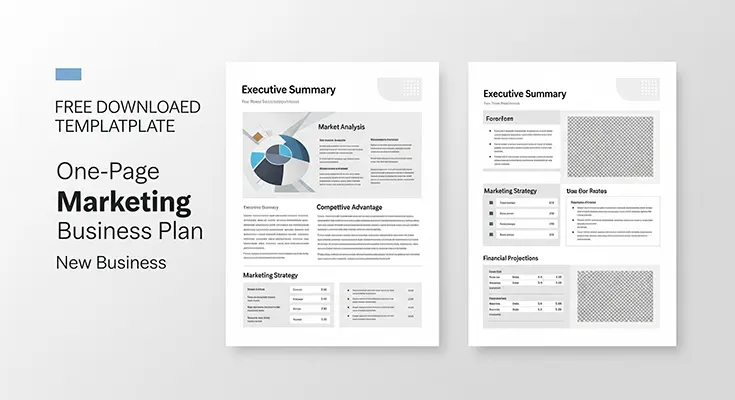Starting a new business can be an exciting but challenging endeavor, especially when it comes to crafting a comprehensive marketing business plan. To help streamline the process for budding entrepreneurs, we have developed a free one-page template that outlines the essential components of a marketing business plan tailored for new businesses. This concise yet comprehensive template will guide you through defining your business objectives, target market, competitive analysis, and marketing strategies to set a solid foundation for your marketing efforts.
1. Business Overview
- Business Name: [Insert Business Name]
- Founder(s): [Insert Founder(s) Name]
- Mission Statement: [Insert Mission Statement]
- Vision Statement: [Insert Vision Statement]
2. Business Objectives
- Define the primary goals and objectives of your business, such as increasing brand awareness, driving sales growth, expanding market share, etc.
- Establish measurable key performance indicators (KPIs) to track the success of your marketing initiatives.
3. Target Market Analysis
- Identify your target audience based on demographic, psychographic, and behavioral factors.
- Conduct market research to understand the needs, preferences, and challenges of your target market.
- Analyze your competitors and identify your unique selling proposition (USP) that sets your business apart.
4. Marketing Strategies
a. Branding and Positioning
- Define your brand identity, including your brand values, voice, and visual elements.
- Position your brand in the market by highlighting what makes your business unique and appealing to your target audience.
b. Product/Service Offering
- Describe your products/services in detail, including their features, benefits, and pricing strategy.
- Outline your product/service positioning and how it meets the needs of your target market.
c. Digital Marketing
- Include digital marketing tactics such as website optimization, content marketing, social media, email marketing, and search engine optimization (SEO).
- Specify your digital marketing budget, key performance metrics, and channels for reaching your target audience online.
d. Traditional Marketing
- Consider traditional marketing tactics like print ads, radio commercials, direct mail, and events to complement your digital marketing efforts.
- Outline your traditional marketing strategy and how it aligns with your overall marketing objectives.
e. Sales and Distribution Channels
- Define your sales strategy, distribution channels, and partner relationships to facilitate product/service delivery to customers.
- Include sales targets, conversion rates, and customer acquisition costs to measure sales performance.
5. Budget and Resource Allocation
- Create a budget for your marketing initiatives, including expenses for digital advertising, marketing tools, personnel, and other marketing activities.
- Allocate resources effectively to maximize the impact of your marketing efforts within your budget constraints.
Crafting a one-page marketing business plan using this free template can help new businesses prioritize their marketing goals, strategies, and resources effectively. By outlining key components such as business objectives, target market analysis, marketing strategies, and budget allocation, entrepreneurs can develop a clear roadmap for launching and promoting their business to potential customers.
Remember, a well-defined marketing business plan serves as a guiding framework for making informed decisions, monitoring progress, and adapting to the dynamic landscape of the business environment. Use this template as a starting point to lay the foundation for a successful marketing strategy that resonates with your target audience and positions your new business for growth and success.





